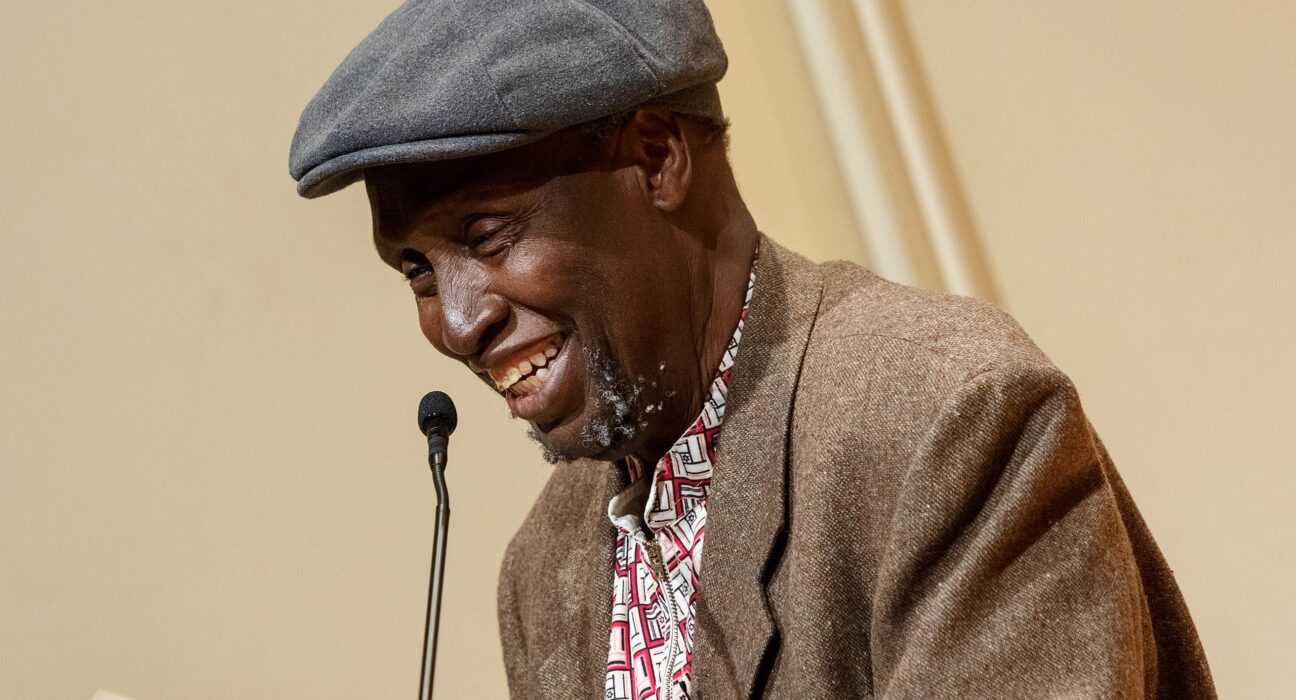Ngũgĩ wa Thiong’o, born James Ngugi in 1938 in Kamiriithu, Kenya, is widely regarded as East Africa’s leading novelist and a pioneer of postcolonial literature. His early works, such as Weep Not, Child (1964), The River Between (1965), and A Grain of Wheat (1967), established him as a literary force, capturing the struggles of Kenya’s colonial and post-independence eras. Over time, Ngũgĩ’s writing evolved into a powerful critique of neo-colonialism, capitalism, and cultural alienation, often expressed through his native Gikuyu language. His commitment to writing in African languages and his activism through community theatre made him a cultural icon—and a target for Kenya’s authoritarian regime.
In December 1977, Ngũgĩ was arrested and detained without trial at Kamiti Maximum Security Prison, an event that sent shockwaves through Kenya’s intellectual community and raised global concerns about freedom of expression. His detention, lasting nearly a year, was not just a personal ordeal but a pivotal moment in Kenyan literature and political history. This article delves into the reasons for his imprisonment, the socio-political climate of the time, and how this experience shaped his literary and activist legacy.
The Political Context: Kenya in the 1970s
To understand why Ngũgĩ was jailed, it’s essential to examine the political landscape of Kenya during the 1970s. After gaining independence from British colonial rule in 1963, Kenya faced the challenge of building a unified nation while grappling with economic inequality, ethnic tensions, and political repression. Under President Jomo Kenyatta, the Kenya African National Union (KANU) consolidated power, creating a de facto one-party state. Critics, including intellectuals and opposition leaders, faced harassment, detention, or worse.
By 1977, Vice-President Daniel arap Moi was a key figure in Kenyatta’s government, known for his hardline stance against dissent. The government was particularly sensitive to criticism of its capitalist policies, which many argued perpetuated the economic exploitation of the colonial era. Ngũgĩ’s works, with their sharp critique of neo-colonialism and advocacy for cultural decolonization, were seen as a direct challenge to this status quo. His involvement in grassroots initiatives, such as the Kamiriithu Community Education and Cultural Centre, further amplified his influence among ordinary Kenyans, making him a perceived threat to the government.
Key Political Issues in 1970s Kenya
- Neo-Colonialism and Economic Inequality: Ngũgĩ’s works, particularly Petals of Blood (1977), highlighted how foreign business interests and a local elite continued to exploit Kenya’s working class.
- Cultural Suppression: The government favored English as the language of education and governance, marginalizing African languages like Gikuyu, which Ngũgĩ championed.
- Repression of Dissent: Intellectuals, journalists, and politicians who criticized the government faced censorship, imprisonment, or exile.
- Mau Mau Legacy: The Mau Mau Uprising (1952–1960), a rebellion against British rule, remained a sensitive topic, with the government wary of narratives that glorified resistance.
Ngũgĩ’s activism and literary output directly engaged with these issues, positioning him as a voice for the marginalized and a critic of the ruling elite.
The Catalyst: Ngaahika Ndeenda and the Kamiriithu Centre
The immediate cause of Ngũgĩ’s imprisonment was his involvement with the Kamiriithu Community Education and Cultural Centre and the production of his play Ngaahika Ndeenda (I Will Marry When I Want), co-written with Ngũgĩ wa Mirii in 1977. The Kamiriithu Centre, established in 1976 in Ngũgĩ’s home village of Kamiriithu, aimed to empower local communities through education and cultural activities, particularly African theatre. Unlike traditional theatre, which Ngũgĩ criticized as elitist, the centre encouraged community participation and used Gikuyu to make performances accessible to ordinary Kenyans.
Ngaahika Ndeenda was a satirical play that critiqued the exploitation of peasants and workers in post-independence Kenya. It exposed the hypocrisy of the new economic elite, the persistence of capitalist exploitation, and the betrayal of the ideals of the Mau Mau struggle. The play’s use of Gikuyu and its performance by local villagers made it a powerful tool for raising political consciousness. Its popularity—it ran to standing-room-only crowds for about a month—alarmed the authorities, who saw it as a threat to the status quo.
Why Ngaahika Ndeenda Was Controversial
- Language Choice: By writing and performing in Gikuyu, Ngũgĩ challenged the dominance of English and empowered local audiences to engage with political ideas in their mother tongue.
- Political Critique: The play’s themes of class struggle and neo-colonial exploitation directly criticized the Kenyatta government’s policies.
- Community Engagement: The participatory nature of the Kamiriithu Centre’s productions fostered a sense of collective resistance, which the government feared could inspire broader unrest.
- Marxist Influences: Authorities confiscated books by Karl Marx, Friedrich Engels, and Vladimir Lenin from Ngũgĩ’s home, accusing him of promoting Marxist ideology.
The play’s success and its radical message prompted Vice-President Daniel arap Moi to order Ngũgĩ’s arrest. On December 31, 1977, police detained him at his home in Limuru, and he was sent to Kamiti Maximum Security Prison without charge or trial. The government also banned Ngaahika Ndeenda and later razed the Kamiriithu Centre, signaling its intolerance for dissent.
Life in Kamiti Maximum Security Prison
Ngũgĩ’s detention at Kamiti Maximum Security Prison was a grueling experience, marked by harsh conditions and psychological challenges. He was held in a cell previously used for “mentally deranged convicts,” alongside other political prisoners. Inmates were allowed only one hour of sunlight per day, and access to books, radios, pens, and paper was severely restricted. Food was often contaminated, and prisoners were confined to their cells for 23 hours a day.
Despite these conditions, Ngũgĩ’s spirit remained unbroken. He famously wrote his novel Caitaani Mũtharabainĩ (Devil on the Cross), the first modern novel in Gikuyu, on prison-issued toilet paper. This act of defiance became a symbol of his resilience and commitment to his cultural and political ideals. In his memoir Detained: A Writer’s Prison Diary (1981), Ngũgĩ recounts the advice of a fellow prisoner: “Don’t let them break you.” This mantra guided him through the ordeal, as he used writing as a form of spiritual survival.
Key Aspects of Ngũgĩ’s Prison Experience
- Writing as Resistance: Ngũgĩ’s decision to write Devil on the Cross in Gikuyu while in prison was a deliberate act of cultural and political defiance.
- Solidarity with Fellow Prisoners: He formed bonds with other political detainees, drawing strength from their shared commitment to justice.
- Psychological Resilience: Ngũgĩ maintained his “psychic integrity” by focusing on his beliefs in Kenyan independence and cultural decolonization.
- Amnesty International Advocacy: Adopted as a prisoner of conscience, Ngũgĩ’s case drew international attention, pressuring the Kenyan government for his release.
Ngũgĩ was released in December 1978, three months after Daniel arap Moi became president following Jomo Kenyatta’s death. However, his release came with a cost: he was barred from resuming his position as a professor at the University of Nairobi, and his family faced ongoing harassment, ultimately forcing him into exile in 1982.
The Impact of Imprisonment on Ngũgĩ’s Career
Ngũgĩ’s imprisonment was a turning point in his life and work. It solidified his commitment to writing in Gikuyu and advocating for the decolonization of African literature. His experience in Kamiti deepened his critique of neo-colonialism and inspired a series of works that continued to challenge oppressive systems.
Literary Shifts Post-Imprisonment
- Commitment to Gikuyu: Ngũgĩ’s decision to write primarily in Gikuyu was a direct response to his imprisonment, as he sought to reclaim African languages from colonial marginalization. Devil on the Cross (1980) and Matigari (1986) are notable examples of his Gikuyu works.
- Exile and Global Influence: After fleeing Kenya, Ngũgĩ taught at prestigious institutions like Yale, New York University, and the University of California, Irvine, where he became a Distinguished Professor of English and Comparative Literature.
- Memoirs and Reflections: His prison experience is documented in Detained: A Writer’s Prison Diary and later memoirs like Dreams in a Time of War (2010) and In the House of the Interpreter (2012), which explore his childhood and the broader context of colonial and postcolonial Kenya.
- Advocacy for African Languages: Ngũgĩ founded the Gikuyu-language journal Mũtĩiri and championed the translation of African literature, as seen in his short story The Upright Revolution: Or Why Humans Walk Upright, translated into 100 languages.
Broader Cultural Impact
Ngũgĩ’s imprisonment highlighted the risks faced by intellectuals in authoritarian regimes and sparked global discussions about freedom of expression. His adoption as an Amnesty International prisoner of conscience brought international scrutiny to Kenya’s political repression. His resilience also inspired a new generation of African writers, including his children—Mũkoma wa Ngũgĩ and Wanjiku wa Ngũgĩ—who have followed in his literary footsteps.
The Legacy of Ngũgĩ’s Resistance
Ngũgĩ’s imprisonment was not just a personal trial but a symbol of the broader struggle for cultural and political liberation in Kenya and Africa. His decision to write in Gikuyu challenged the dominance of colonial languages and empowered African voices. His works continue to resonate with readers worldwide, addressing universal themes of justice, resistance, and identity.
Ngũgĩ’s Enduring Influence
- Decolonizing Literature: Ngũgĩ’s advocacy for African languages has inspired movements to promote indigenous literary traditions across the continent.
- Global Recognition: Despite not winning the Nobel Prize, Ngũgĩ has received numerous accolades, including the 2001 International Nonino Prize and the 2016 Park Kyong-ni Prize.
- Political Activism: His involvement in the December Twelve Movement (DTM), a Marxist-Leninist group, underscored his commitment to intellectual warfare against oppressive regimes.
- Cultural Resilience: Ngũgĩ’s ability to create under duress—writing a novel on toilet paper—remains a powerful testament to the role of art in resistance.
Ngũgĩ’s return to Kenya in 2004, after 22 years in exile, was marred by a violent attack on him and his wife, believed by some to be politically motivated. Yet, his love for Kenya remained unconditional, as he stated in a 2020 NPR interview: “Kenya made me. I am who I am because of Kenya.” His later reception by President Uhuru Kenyatta in the State House symbolized a partial reconciliation, though Ngũgĩ continued to critique corruption and inequality in Kenya.
Ngũgĩ’s Relevance in Modern Kenya
Today, Ngũgĩ’s works remain relevant as Kenya grapples with issues of governance, inequality, and cultural identity. His critique of the “haves and have-nots” in Kenyan society, as articulated in a 2022 article in The Standard, resonates in a country still navigating the challenges of post-independence development. Young Kenyans, in particular, find inspiration in his call to resist injustice and reclaim African cultural heritage.
Lessons for Contemporary Kenya
- Cultural Empowerment: Ngũgĩ’s emphasis on African languages encourages young writers to explore their linguistic heritage.
- Resistance Against Corruption: His novels, such as Devil on the Cross, continue to critique systemic corruption, a persistent issue in Kenyan politics.
- Intellectual Freedom: Ngũgĩ’s imprisonment serves as a reminder of the importance of protecting free speech and artistic expression.
- Pan-African Vision: His work with the Jalada collective, which translated The Upright Revolution into 100 languages, underscores the potential for a pan-African literary market.
Ngũgĩ wa Thiong’o’s imprisonment in 1977 was a defining moment that encapsulated the tension between artistic freedom and political repression in postcolonial Kenya. His arrest, prompted by the radical message of Ngaahika Ndeenda and his activism through the Kamiriithu Centre, highlighted the government’s fear of intellectual dissent. Yet, Ngũgĩ’s resilience—writing Devil on the Cross on toilet paper and continuing his advocacy in exile—transformed his ordeal into a powerful narrative of resistance.
His legacy as a “language warrior” and champion of African literature endures, inspiring writers, activists, and readers worldwide. For Kenya, Ngũgĩ’s story is a call to confront the challenges of neo-colonialism, corruption, and cultural alienation while celebrating the resilience of the human spirit. As he once wrote, “Resistance is the best way of keeping alive.” Ngũgĩ’s life and work embody this principle, ensuring his place as a cornerstone of Kenyan and African literary heritage.





